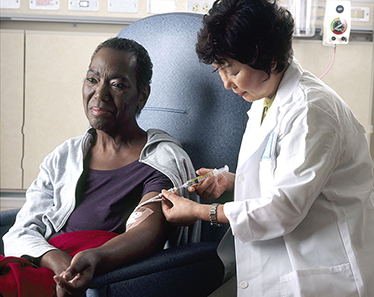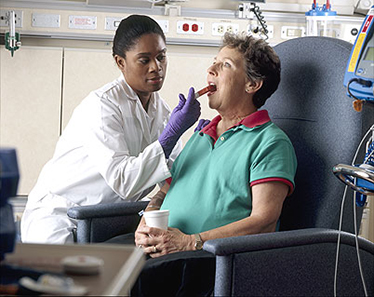Introduction to Chemotherapy
Chemotherapy is a distinctively different approach than surgery and radiation therapy to treat cancer. Chemotherapy is used as primary treatment, neoadjuvant, adjuvant treatment, and as palliative. Rather than physically removing a tumor or a part of it, chemotherapy uses chemical agents (anti-cancer or cytotoxic drugs) to interact with cancer cells to eradicate or control the growth of cancer. Chemotherapy is used after surgery as adjuvant treatment to eradicate any microscopic cancer cells, and/or to decrease the likelihood of cancer recurrence.
Chemotherapy is often used as a neoadjuvant treatment. When chemotherapy is used as neoadjuvant treatment, it is designed to reduce the size and or bulk of the tumor so surgical resection can more easily be performed.
Essentially chemotherapy is used in several ways
- Primary treatment for the cancer – systemic therapy only
- As neoadjuvant treatment to reduce the size of the tumor before surgery
- As adjuvant or added treatment for potential microscopic disease and/or to reduce cancer recurrence
- As a palliative treatment when the cancer cannot be eradicated to control pain by reducing size of the cancer and controlling other symptoms
- Chemotherapy may also be used in combination with radiation therapy and during surgery
Chemotherapy drugs works by
- interfering with DNA synthesis
- damaging a cell's genetic material (DNA)
- preventing the cell from dividing
Since chemotherapeutic drugs cannot distinguish between normal cells and cancer cells, both types of cells are affected by chemotherapy. Toxicity of chemotherapeutic agents to normal cells is the cause of unpleasant side effects. However, the value of chemotherapy lies in the fact that the killing effect of chemotherapeutic agents has a definite selectivity for cancer cells over normal host cells. Normal tissues are able to repair themselves and continue to grow, so the injury caused by chemotherapy is rarely permanent.
Chemotherapy is a systemic method of cancer treatment. The drugs used in chemotherapy are able to reach most parts of the body. Therefore, chemotherapy is likely to be recommended for
- cancer that has already spread to other areas of the body
- tumors that occur at more than one site
- tumors that cannot be removed surgically
- treat recurrent disease
Advantages of Chemotherapy
- less mutilating than surgery
- helps conserve organ or limb function
- for some cancers, chemotherapy alone can destroy all the cancer cells
- as an adjuvant treatment increases the effectiveness of cancer treatment
- can minimize the discomfort caused by cancer
- can reduce the risk of recurrence
- can slow the progression of the disease
- can prolong survival
Chemotherapy is given via many routes including but not limited to intravenous, subcutaneous, intramuscular and oral. The diagrams depict nurses administering chemotherapy.

Figure 1. A nurse administers chemotherapy.
Source: Rhoda Baer (Photographer), National Cancer Institute.

Figure 2. A nurse administers Oral Chemotherapy.
Source: Rhoda Baer (Photographer), National Cancer Institute.
As a primary treatment, chemotherapy is used for some cancers such as
- Hodgkin Lymphoma
- Leukemia
- Burkitt lymphoma
- Diffuse large cell lymphoma
- Wilms tumor
- Small cell lung cancer
- Testicular cancer
Chemotherapy may be given prior to surgical resection or radiation therapy to shrink the tumor and make it easier to resect. This type of chemotherapy is called neo-adjuvant, induction, or preoperative chemotherapy.
Chemotherapy may be given after surgical resection to address microscopic disease and/or reduce cancer recurrence. This type of chemotherapy is called adjuvant chemotherapy.
As a palliative therapy, chemotherapy can be used to help make the cancer patient's life as comfortable as possible. In the case of inoperative cancers, chemotherapy is administered to relieve symptoms and serious complications. As a palliative therapy, chemotherapy, when given in non-therapeutic doses, can help make the cancer patient's life as comfortable as possible.
Every cancer is unique, as is every cancer patient; therefore, the oncologist takes great care to tailor the chemotherapy plan to the particular case. The treatment protocol specifies
- what type of drug(s) should be given
- what dosage should be given
- how to administer the drug(s)
- how often the drug(s) should be given
- how long the treatment should last
During chemotherapy, the oncologist may change or modify the treatment plan to achieve better results, closely monitoring the progress of the cancer patient and the response of the tumor to treatment.
Updated: December 21, 2023
Suggested Citation
SEER Training Modules: Introduction to Chemotherapy. U.S. National Institutes of Health, National Cancer Institute. Cited 03 March 2026. Available from: https://training.seer.cancer.gov.




